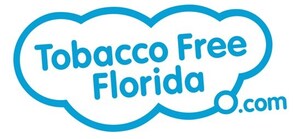TOBACCO FREE FLORIDA WEEK TO HIGHLIGHT TOBACCO CESSATION AND MENTAL HEALTH AWARENESS
Annual observance's theme announced as "Mental Health Equals Mental Wealth: Overcoming the Influences of Tobacco on the Mind"
TALLAHASSEE, Fla., May 9, 2022 /PRNewswire/ -- The Florida Department of Health's Bureau of Tobacco Free Florida is dedicating its annual Tobacco Free Florida Week observance to raising awareness of the connection between tobacco use and improving mental health. "Mental Health Equals Mental Wealth: Overcoming the Influences of Tobacco on the Mind" is scheduled for May 8-14, and takes place as part of Mental Health Awareness Month. Tobacco Free Florida Week is the annual initiative focusing on a specific public health issue, cause or concern connected to tobacco use and its impact across Florida.
Tobacco Free Florida is using "Mental Health Equals Mental Wealth" to address and correct misconceptions, including that tobacco provides an alternative when people feel stressed or anxious. Part of this traces back to decades ago, with tobacco companies marketing heavily to those with mental health issues and promoting myths and falsehoods about the supposed health benefits of tobacco use.1
Tobacco Free Florida Week will inform about tobacco's disproportionate impact on people diagnosed with mental and behavioral health conditions, educate about the benefits of quitting and highlight the free cessation support for people looking to improve their mental health and wellness. As Mental Health Awareness Month explores ways to achieve positive change, a major discussion in this area can be the importance of quitting tobacco for good.
"Overall, tobacco use has dropped considerably and consistently over the 15 years since Tobacco Free Florida was founded, but it hasn't been uniform and some communities are still being hit hard by the negative effects of tobacco and nicotine," said Laura Corbin, Bureau Chief for Tobacco Free Florida.
People with behavioral health conditions are more likely to smoke cigarettes, have greater nicotine dependence, suffer greater withdrawal symptoms when quitting and report lower quit rates.2 However, the good news is that when people diagnosed with mental or behavioral health issues quit smoking, they are also more likely to avoid other drugs and harmful substances.3
People with mental or behavioral health conditions:
- Are more likely to smoke cigarettes, have greater nicotine dependence, suffer greater withdrawal symptoms when quitting and report lower quit rates.4
- Have high rates of morbidity and mortality from smoking related illnesses such as cardiovascular disease, respiratory diseases and cancer.5
- Die about five years earlier than people without such conditions, and more than 50% are from tobacco-attributable diseases.
During Tobacco Free Florida week, health care providers are encouraged to help patients find alternatives to smoking when having anxiety or feel stressed. This could include speaking to a licensed therapist or counselor, going on a long walk outside for fresh air, exercising or practicing relaxation techniques such as meditation or yoga. This can be an important part of a quit attempt being successful. For many people, quitting takes several attempts. A health care provider's support can make the difference.
Understanding that mental health professionals may have sporadic or limited time with patients, Tobacco Free Florida is also raising awareness during Tobacco Free Florida Week of the ways to quickly and effectively refer patients to free quit tools. Additional information including forms for free office display materials and links to automated e-referral forms are available at www.TobaccoFreeFlorida.com/healthcare.
"Tobacco has especially harmful effects on people dealing with mental and behavioral health issues," said Corbin. "That's why it's such a concern that tobacco use remains so prevalent among people pursuing 'mental wealth' and that's why we're asking all of Florida to join us in prioritizing this important work."
For more information and free resources, visit TobaccoFreeFlorida.com/MentalHealth.
The Florida Department of Health's Tobacco Free Florida campaign is a statewide cessation and prevention campaign funded by Florida's tobacco settlement fund. Since the program began in 2007, more than 254,000 Floridians have successfully quit using one of Tobacco Free Florida's free tools and services. There are now approximately 451,000 fewer adult smokers in Florida than there was 10 years ago, and the state has saved $17.7 billion in health care costs. To learn more about Tobacco Free Florida's Quit Your Way services, visit www.TobaccoFreeFlorida.com or follow the campaign on Facebook at www.facebook.com/TobaccoFreeFlorida or on Twitter at www.twitter.com/tobaccofreefla.
1 Apollonio, D., & Malone, R. E. (2005). Marketing to the marginalised: tobacco industry targeting of the homeless and mentally ill. Tobacco Control, 14(6), 409-415. http://dx.doi.org/10.1136/tc.2005.011890 Retrieved from https://escholarship.org/uc/item/73d0x34w
2 Prochaska, J; Das, S.; Young-Wolff, Kelly. "Smoking, Mental Illness and Public Health." Annu. Rev. Public Health 2017. 38:165-85. https://doi.org/10.1146/annurev-publhealth-031816-044618.
3 Weinberger, Andrea H et al. "Cigarette Smoking Is Associated With Increased Risk of Substance Use Disorder Relapse: A Nationally Representative, Prospective Longitudinal Investigation." The Journal of clinical psychiatry vol. 78,2 (2017): e152-e160. doi:10.4088/JCP.15m10062
4 Prochaska, J; Das, S.; Young-Wolff, Kelly. "Smoking, Mental Illness and Public Health." Annu. Rev. Public Health 2017. 38:165-85. https://doi.org/10.1146/annurev-publhealth-031816-044618.
5 Schroeder S A, Morris CD. Confronting a neglected epidemic: tobacco cessation for persons with mental illnesses and substance abuse problems. Annual Review of Public Health, 2010;31:297–314.
SOURCE Tobacco Free Florida

WANT YOUR COMPANY'S NEWS FEATURED ON PRNEWSWIRE.COM?
Newsrooms &
Influencers
Digital Media
Outlets
Journalists
Opted In





Share this article